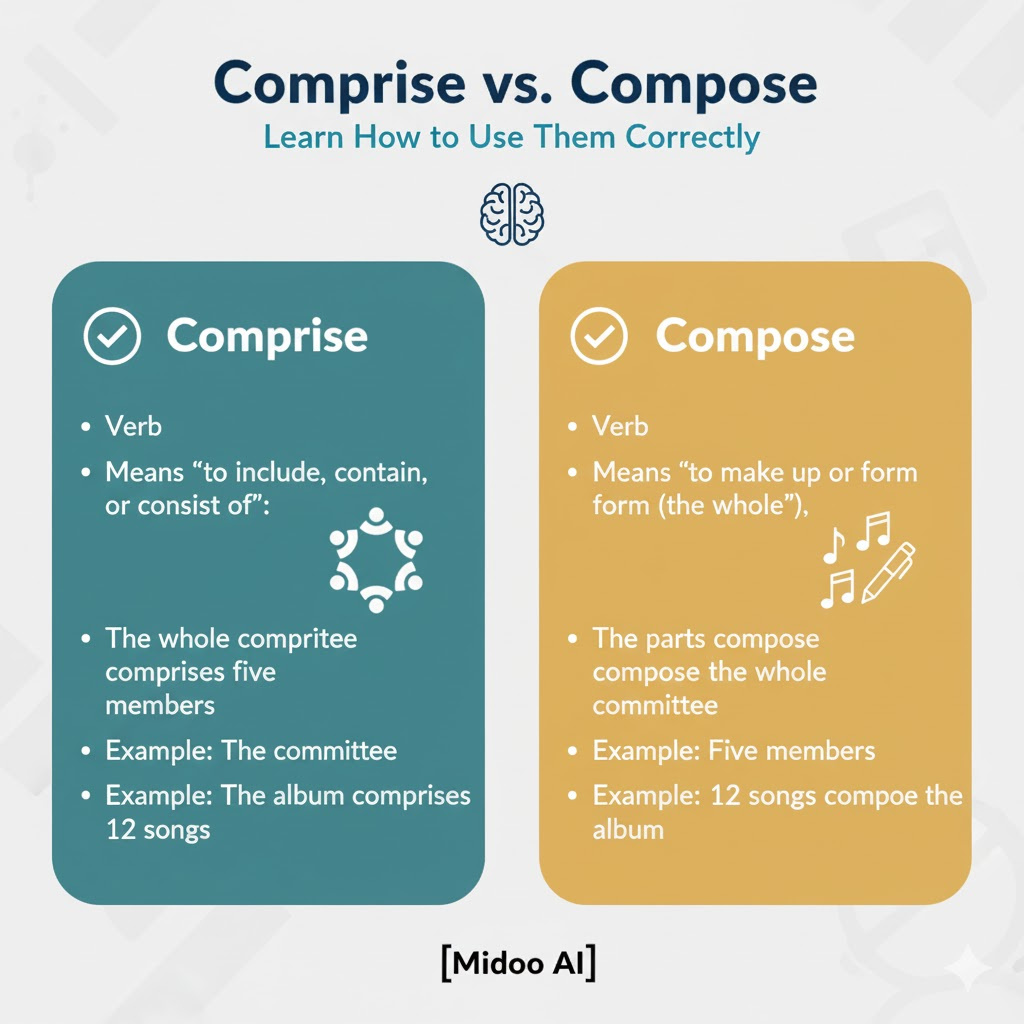Comprise vs. Compose — Learn How to Use Them Correctly

English learners often find “comprise” and “compose” confusing — and for good reason. Both deal with how parts and wholes relate, but they aren’t interchangeable.
At Midoo AI, we frequently see even advanced learners mix these two words up in writing. The key lies in understanding which direction the relationship goes — does something comprise parts, or is it composed of parts? Let’s break down the difference step by step so you’ll never hesitate again.
1. The Core Difference
- Comprise means to include or to consist of. The whole comprises its parts.
- Compose means to make up or to form. The parts compose the whole.
So the relationship is reversed:
The whole comprises the parts.
The parts compose the whole.
2. “Comprise” Explained
Comprise describes something that includes or contains other things. Importantly, the word already means “consists of,” so saying “is comprised of” is often considered incorrect by traditional grammar rules (though common in everyday English).
Examples:
- The United Kingdom comprises England, Scotland, Wales, and Northern Ireland.
- The committee comprises ten members.
- The solar system comprises eight planets.
- Her book comprises ten short stories.
Tip: The subject (whole) comes first. Think of it like this:
Whole → comprises → parts
✅ Correct: The team comprises ten players.
❌ Incorrect: The team is comprised of ten players.
That last version is widely used but still frowned upon in formal writing.
3. “Compose” Explained
Compose focuses on the action of forming or making something up. It emphasizes how the parts combine to form a whole.
Examples:
- The United Kingdom is composed of four countries.
- Water is composed of hydrogen and oxygen.
- The jury is composed of twelve people.
- The symphony was composed by Mozart.
Notice how “compose” often appears in the passive voice (is composed of), while “comprise” is used in the active voice.
Tip: The parts form the whole.
Parts → compose → whole
✅ Correct: The meal is composed of several local dishes.
❌ Incorrect: The meal composes several local dishes.
4. Quick Comparison Table
| Concept | Comprise | Compose |
|---|---|---|
| Meaning | To include, contain | To make up, form |
| Structure | Whole → comprises → parts | Parts → compose → whole |
| Common Form | Active voice | Passive voice (“is composed of”) |
| Example | The U.K. comprises four nations. | The U.K. is composed of four nations. |
| Formality | Preferred in formal writing | Common and widely accepted |
5. Common Mistakes
❌ The book is comprised of ten chapters.
✅ The book comprises ten chapters.
❌ Four musicians comprise the band.
✅ The band is composed of four musicians.
Tip: If your sentence works better with “is composed of,” use that — it’s perfectly acceptable and clear. But in concise, formal writing, “comprises” often sounds stronger and more direct.
6. Easy Memory Hack
Think of the two C’s:
- Comprise → Container (the whole holds its parts)
- Compose → Components (the parts build the whole)
Or visualize this:
🧩 Parts compose the whole.
📦 The whole comprises the parts.
7. Real-Life Usage
- Formal writing (academic/business):
- The university comprises six colleges.
- The report is composed of three sections.
- Everyday conversation:
- The U.K. is composed of four countries.
- The collection comprises 100 rare coins.
- Scientific context:
- Air is composed of nitrogen, oxygen, and other gases.
- The solar system comprises all celestial bodies orbiting the sun.
FAQS
Q1: Can I say “is comprised of”?
Technically, it’s considered redundant because comprise already means consists of. However, it’s common in modern usage, even in journalism. In formal writing, prefer “comprises” or “is composed of.”
Q2: Which is more formal, “comprise” or “compose”?
Comprise sounds more formal and precise, while compose is slightly more neutral and flexible in tone.
Q3: Do native speakers mix them up?
Yes, frequently! Even professional writers sometimes use “is comprised of.” While it’s widely understood, using them correctly makes your writing stand out.
Q4: Can “compose” be used in other meanings?
Yes. “Compose” can also mean to create (music, writing, art) or to calm oneself.
- She composed a new song.
- He composed himself before speaking.
Q5: Should I avoid “is comprised of” completely?
If you’re writing academic, business, or professional English, yes — avoid it. In casual writing, it’s acceptable but not ideal.